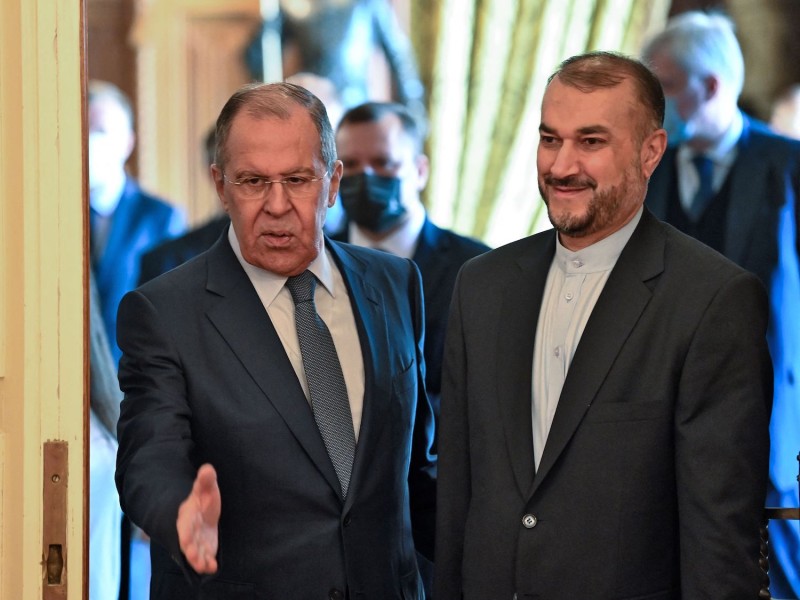Alwaght- The Iranian Foreign Minister Hussein Amir-Abdollahian visited Moscow on Tuesday. The trip drew a significant reactions on the media outlets as well as in political circles, and more than any other issue, the timing of the trip was in the spotlight. On the one hand, Amir-Abdollahian's visit to Moscow took place in the middle of Russia's special military operation in Ukraine, and on the other hand, in the past week, the Western media and politicians have been spreading a wave of propaganda about Russia's plan to obstruct the revival of Iran nuclear deal, officially called Joint Comprehensive Joint Plan of Action (JCPOA).
Aside from the reactions, an important question is about the goals and achievements of the visit.
Bilateral cooperation boost
The first and most important goal of the Iranian FM in the midst of a wide wave of international developments is bolstering bilateral relations. Upon his arrival in the Russian capital, referring to the goals of this trip, Amir-Abdollahian said: "Today, my companions and I are in Moscow with several goals; the first goal is to follow up on the agreements reached during President Raisi's visit to Moscow in January and the agreements reached between the two presidents."
During the meeting with Russian counterpart Sergei Lavrov, Amir-Abdollahian emphasized the importance of implementing the agreements reached during the visit of President Sayed Ibrahim Raisi of Islamic Republic of Iran to Moscow, and noted Tehran's determination to develop relations with neighboring countries, including Russia. He stressed that the process of developing relations with neighbors and particularly Russia will go ahead in uninfluenced by any third party or international developments, regardless of the outcome of the talks for revival of nuclear deal in Vienna.
On the other hand, Lavrov, referring to the need to implement the agreements reached during the recent meeting of the two presidents in Moscow, stressed his country's readiness to enhance cooperation with Iran in all fields, especially in the economic sector.
At a press conference with his Iranian guest, the Russian FM said the two started negotiations on permanent membership of Iran in Eurasian Economic Union (EEU).
"Iran has long been a party to the Eurasian Economic Union Interim Agreement, and we have now begun the process of concluding a permanent agreement between Iran and the Union. It is quite obvious that this agreement is in the interest of the participants in the Eurasian Union agreement," said Lavrov.
Coordination on sanctions lifting talks
In addition to bilateral relations, the most important goal of Moscow visit was further closeness of stances in the ongoing talks for lifting the anti-Iranian sanctions to pave the way for revival of nuclear deal.
Holding that one of his main goal in the trip is discussion of the negotiations with the West, Amir-Abdollahian said that comments and news reports say that if we reach an agreement in Vienna with the US and other Western parties, the Russian side may not have the necessary support in Vienna.
These comments should give us a conclusion: He visited Moscow for assurances of positive Russian stance on a potential nuclear agreement.
After meeting with Emir-Abdullahian, Lavrov announced Russia's full support for the finalization of the Vienna agreement, stressing that Russia would not block the Vienna agreement, contrary to US claims, and continues its constructive approach to collective efforts until the end of the talks.
Mikhail Ulyanov, the Russian envoy to international organizations in Vienna, on Thursday in a Twitter post referred to the media reports about "last-minute" Russian demand in the final nuclear talks.
"As I have tweeted several times over the past week, this is a lie. Some requests have also been accepted," his tweet read.
In addition to remarks by Russian officials, the Iranian FM tweeted after meeting with Lavrov, saying: "I had a constructive meeting with the Russian Foreign Minister on bilateral issues, the Vienna talks, Ukraine, Syria, Yemen, and Afghanistan. We were reassured that Russia was still working to reach a final agreement in Vienna. More than ever, the ball is in America's court to provide the answers needed to successfully conclude the negotiations."
Russia's foreign ministry spokeswoman Maria Zakharova said in a statement that Moscow has always made "significant contributions" to the Vienna talks and that the text of the agreement has been revised to protect Iran-Russia cooperation.
On the other hand, the US State Department spokesman Ned Price also stressed that Washington would not impose sanctions on Moscow for its involvement in Iran's nuclear projects.
These positions and statements clearly show that Amir-Abdullahian has made a very special achievement in the field of the nuclear agreement and the Vienna talks.
Strengthening bilateral work on regional crises
Another goal was boosting the coordination of stances between Tehran and Moscow officials. Certainly, one key issue at present is Ukraine crisis. Of course, Tehran as a country with an independent vision and policy tries to make peace between Moscow and Kiev to end the conflict.
Shortly after his arrival in the Russian capital, Amir-Abdollahian said "we, naturally, cannot be indifferent to Ukraine war. We explicitly condemn war no matter in Ukraine, Afghanistan, Yemen, or anywhere in the world, as we condemn the unilateral sanctions on countries and nations. We insist on a political solution to Ukraine case.
Also, like over the past years, Syria was another case of discussion for bilateral cooperation. It seems that the Iranian FM had crucial talks with his Russian counterpart to increase the coordination between the sides in Syria case.



























